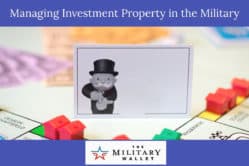After being in the military for almost 15 years, my wife and I have seen almost everything in the form of housing. We’ve lived on bases and off post. We’ve been homeowners and have rented homes.
There are many advantages and disadvantages to each choice whether you and your family are living on post, buying a home, or renting a house. No one choice is right for every family. And, you may find that different choices are right at different points in your life and career. You also may find yourself backed into a corner having to choose one housing option over another.
Buy, Rent, or Live on Base for Your Next Home?
Here are a few things to consider about each choice, including living on base, or deciding to rent or buy. We’ve included both the good and the bad that comes with each decision.
Buying a House
Buying a home is still part of the American dream. And, now with housing prices making a comeback after the recent recession and housing bubble, homeownership is on the rise once again in the United States. But, buying a house is tricky for members of the military and their family.
Pros
The tax benefit is one of biggest advantages of owning your own home. For most, the mortgage interest tax deduction is an excellent way to reduce your taxable income. Additionally, owning your home typically requires you to itemize your taxes instead of taking the standard deduction, which can help you save additional money.
A home is an asset, and it is often the largest asset in most people’s financial portfolios. Owning your home allows you to borrow against it. And, owning a home can also allow you to generate income from it if you were to rent it. Renting out your home is often a great source of passive income in retirement.
Finally, owning a house gives you a sense of belonging in the neighborhood. You establish roots in the community. Renters have a feeling of belonging but not like a homeowner.
Cons
It’s rough for a member of the military to buy a home and sell it during a duty assignment. In many cases, staying in one place for an average of three years isn’t very conducive to owning a home, especially if you have to sell the home when it’s time to PCS instead of renting it to a tenant.
It is hard to recoup the costs of selling a home if you bought it only a couple years ago. The price of the home will typically not appreciate enough in the span of three years to cover the closing costs and realtor fees that you will most likely incur as the seller.
Or, you may find yourself trying to list the home at too high of a sales price trying to recapture your closing costs. It’s a double edge sword. You may find yourself priced too high to cover the costs and have trouble finding a buyer. Or, you might simply have to pay the closing costs, which can be 6% of the selling price or more, out of your pocket. That’s a steep price to pay every three years to own a home while serving in the military.
Buying or selling a home can often be long process. It can be tricky for a member of the military who has orders to report on a specific day to his or her next duty station. It can take months for a home sale to close.
Renting a House
Members of the military are pros at renting homes around bases in America. After years of renting, many are acutely aware of the tradeoffs involved with being renters.
Pros
One of the benefits of renting a home is that there are fewer costs associated and the move in is typically quicker than had you bought a home. Typically, the only costs related to moving into a rental home are a security deposit and fees to turn on your utilities.
Renting a home also often gives you a greater choice of homes or apartments to suit your needs in the neighborhood that you want. There are often just as many homes available to rent in a particular area as there are to purchases. Renting provides you with flexibility and the ability to pick the community that you would be happiest living in with your family.
Cons
Of course, one of the largest downsides to renting is that you have no ownership in the home. Your rent payments simply go to help another person pay off their mortgage. After you’re done renting, you don’t have any equity in the home that you’ve been paying for years to rent.
Another downside that I personally hate is dealing with landlords and property managers. It never fails. I always find property managers who must typically deal with deadbeat tenants that don’t pay their rent on time. I always feel that those property managers treat me with so much disdain and contempt. And, it seems like they are always on the homeowner’s side in any dispute. The property manager typically only considers any issues I raise or requests I make with healthy dose skepticism and immediate distrust. These issues don’t come up if you own the home, of course.
I also hate the limited amount of changes you can make to a rental house. My wife and I were forced to sign a very strict lease at our current duty assignment. The lease limits what we can do in the yard, paint colors on the walls, and other updates that we have to seek permission for first. While this isn’t new to any renter, the limit on your freedom is definitely a drawback for a renter.
Living on Base
When it is time to move to another duty assignment, living on base is one of the biggest points of contention between my wife and me. There are so many tradeoffs that families have to make when living on the base.
Pros
For the past seven years, I’ve had a 45 minute commute to work. My wife didn’t care about my miserable commute. She only cared, rightly so, about good schools for our children. I loved living on post where my commute was five minutes or less. Just think of all the savings on gas and time in the morning spent with your family when your commute is the same time it takes to listen to a single song on the radio.
Another great benefit of living on the base is the incredible community that service members find in the neighborhood. Everyone in your neighborhood is typically the same rank as you are, in the same units, has the same aged kids, and a lot of similarities built right into the neighborhood. You usually can’t find that in civilian neighborhoods, especially in such a concentration as on post.
Living on post also helps keep you close to childcare, medical facilities, shopping, and other amenities.
Cons
In my opinion, the homes on bases are typically not worth your housing allowance. Even the new privatized houses on bases often cannot compete with rental prices of similar homes in the community. For example, I currently pay $1,650 for a 2,486 square foot, four bedroom, two and a half bath home about 15 minutes from the base. The only comparable home on the base is 2,270 square feet, and the privatized housing office would take my entire basic allowance for housing (BAH) of $2,061 for the privilege to live on post. The math of living on post simply doesn’t add up in many cases.
Another drawback of residing on the base is that it isn’t always available. After years of a 45-minute commute, I was adamant about wanting to live on base at my next assignment. But, I sat on the waiting list for three months prior to PCSing before the housing office told me that there wouldn’t be a home available for my family and me to move into before we arrived at my next assignment. In fact, I finally did get a call after starting my new job that a home would be available in October after having moved into a rental home in the summer.
And, finally, poorly rated schools are another reason many service members choose not to live on the base. A few bases have good schools, but now many simply don’t have any schools on post. And, parents are forced to bus their children out into the community. And, like homes and businesses right outside the gate of a military base, the schools are not always the best immediately outside of a military base’s gates.
It’s a tough choice to find housing in the military. It’s a constant struggle with tradeoffs. What are you and your family willing to give up to live on the base? What are you willing to give up to be a homeowner or to live in an incredible school district?
Will your commute suffer like mine did? Will you spend a 20-year career in the military as a renter and forgo the benefits of homeownership?
There’s no right answer for you and your family’s housing choice. Every family and every assignment are different. You have to make the best decision for you at the time. Sometimes timing is everything.
Which is your favorite housing choice when moving to a new duty assignment? Did you decide to rent or buy?



Comments:
About the comments on this site:
These responses are not provided or commissioned by the bank advertiser. Responses have not been reviewed, approved or otherwise endorsed by the bank advertiser. It is not the bank advertiser’s responsibility to ensure all posts and/or questions are answered.
Marty says
Wow, I cannot believe no one has commented on this at all. Very good article as well as the 2 part one you published. As a 32 year veteran can attest to the pros and cons. Sometimes very hard decision to make. The waitlist is probably the biggest one, especially in high cost areas.
I would add to the on base CON: when you move out, extreme cleaning and very picky inspection.
You definitely hit the nail on the head with giving up BAH to the housing office. The housing is generally not worth the loss. The past 2 times, I lived on base felt like I was getting robbed. And the metering of electricity was not good. I understand why they do it, but the neighborhood I was in had couples living in the same community as family’s and we ended up paying extra some months. I felt the comparison was not fair. We were good about turning lights off and managing heat and a/c, but the couples were hardly ever there.
-some bases have new housing and some have the old houses. I think they should be rent based, not rank based when it comes to the BAH. Should not have to give up all of it in substandard housing.
Renting is not the best. You save cost in repairs, but if you do need to fix something, may have to wait a week or more for the management/landlord to get it fixed.
I could go on and on, but this article hit on most of them. Good job.
thanks, Marty